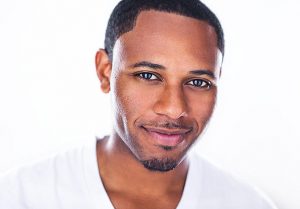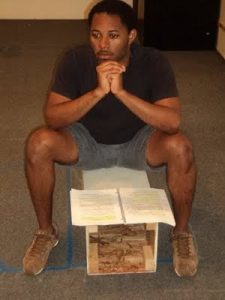
 Larry Powell has been blessed with the opportunity to be a part of some of the most exciting theatre in America. His first gig was originating role of Felix Goodwin in Robey Theatre Company's "Bronzeville" -- to rave reviews and a NAACP nomination. He has since played roles such as Marcus in Robert O'Hara's next-level production of "Marcus; or the Secret of Sweet" and Malcolm in the first regional production of "Broke-ology", directed by Kyle Hatley at KCRep. Most recently he has portrayed Martin Luther King in the Actors Theatre of Louisville production of Katori Hall's "The Mountaintop".
Larry Powell has been blessed with the opportunity to be a part of some of the most exciting theatre in America. His first gig was originating role of Felix Goodwin in Robey Theatre Company's "Bronzeville" -- to rave reviews and a NAACP nomination. He has since played roles such as Marcus in Robert O'Hara's next-level production of "Marcus; or the Secret of Sweet" and Malcolm in the first regional production of "Broke-ology", directed by Kyle Hatley at KCRep. Most recently he has portrayed Martin Luther King in the Actors Theatre of Louisville production of Katori Hall's "The Mountaintop".
This marvelous actor is also well versed and passionate about coaching, and has a vision of creating a safe haven for actors to train and grow. Among his current projects are his 'Free-Fall Intensive,' set for November 15th and 16th.
StageBuddy chatted with Powell to ask about his start in the business, what it is like to coach actors, and lessons learned from performing in "The Mountain Top".
StageBuddy: How did you get started in acting?
Larry Powell: This question seems to always shock my system. Acting really is just the thing that I've always done. I guess I began training when I was young -- I was 12. I went to a school called Amazing Grace Conservatory in South Central, Los Angeles. I grew up learning one-on-one in intimate settings, learning from working professionals.
 How do you personally achieve being the fullest you can be on stage?
How do you personally achieve being the fullest you can be on stage?
I really approach the work from a very intuitive place; I sit with the characters in a very personal way. I believe it all starts with the text. I really believe that the character chose me as much as I chose the character, these words chose me as much as I chose these words -- so in coming from that place, I cut off the ability to lie. For me, that's the beginning of the road: I can't pretend if it's somewhat meant to be. In that there is a built-in opportunity to surrender to see the text as the truth, knowing myself so fully and deeply in that moment in order to serve the text.
What's one of the biggest lesson you took away from performing in "The Mountaintop"?
"The Mountaintop" taught me to trust the fact that as much as I seemingly transform, I have to trust that when I step out on the stage, if I focus on being honest then I will be protected and grounded in truth and no matter what I do it will be correct as long as it's true. All the rest is direction and style. I was reading this book called "A Mystic in the Theater: Eleonora Duse" by Eva Le Gallienne; she speaks about how acting is an ugly word, and I really agree with that. I don't believe I start acting and stop living. I learned to love every single thing that I did in the role. I learned to love the blocking, love the words, literally falling in love with my work. I previously would be insecure about my work because I wouldn't know how I did it, people would comment, 'that was great, you truly transform.' There were so many times during "The Mountaintop" I would be afraid because I literally had forgotten what I had did before. And every night I would do it. I realized I don't have to do what I did before. Part of the gift is trusting that whatever happens in this moment will be better than what I did before. There was something liberating in that.
[youtube]https://www.youtube.com/watch?v=1_4IqQvWl1k[/youtube]
When did you start coaching?
I always wonder if that's the word that I'll end up using, but that's the best word that works. At AGC [Amazing Grace Conservatory] I would TA, always wanting to help out my peers; and in high school and all throughout Carnegie Mellon I was a Voice and Speech TA, doing warmups with the classes below me, leading warmups for productions. I was constantly reading other books on acting; I have this insatiable hunger to learn more and more about the craft. I don't even know when this happened, but my thirst became obsessive to learn more and more, maybe stemming from me wanting to be the best that I can be, which I think is a lifelong journey; we're always learning. As I and my peers became more and more professional, so did my coaching, because we'd have to organize things a certain way. All of a sudden, I had people reference by way of colleagues saying, 'Hey, Larry, can you come work with me on this?' -- and they started booking me. Everyone would always tell me, 'You're going to be a teacher, you're going to write an acting book.'
(This interview has been edited and condensed.)
More on Powell's Upcoming Session: